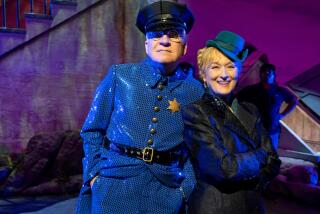TV REVIEW : Cursory ‘Murder’ Lacks Insight and Context
- Share via
Although not necessarily good, television is frequently hasty. On Sunday, CBS presented Leona Helmsley--whose recent tax fraud conviction is on appeal--as a fang-toothed sex goddess with panoramic lips. And tonight it’s this.
Only 11 months after Carol Stuart’s murder, and less than nine months after the apparent suicide of her husband and presumed slayer, Charles Stuart, a movie about this bizarre, disturbing, unresolved and still-puzzling case is hitting the airwaves.
“Good Night, Sweet Wife: A Murder in Boston” airs at 9 tonight on Channels 2 and 8, almost as if CBS had put in a 911 call for another quickie movie about a sensational crime and this is the one that showed up.
In fact, there is a 911 connection here, for the story begins with Charles Stuart’s anguished 911 call on his car phone reporting that he and his pregnant wife had been shot after leaving a birthing class. And Arnold Shapiro, executive producer of the CBS series “Rescue 911,” carries the same title on this movie.
“Good Night, Sweet Wife” is taut and well acted by Ken Olin as furrier Charles Stuart and Margaret Colin as Michelle Caruso, the Boston Herald reporter celebrated here as being practically the only early doubter of Stuart’s story that it was a black assailant who seriously wounded him and murdered his wife.
“Only one reporter had the courage to find out” the truth, a CBS promo proclaims. If so, Caruso’s skepticism is about the only revelation in this movie, which, in the main, is thin and vacant, essentially regurgitating news coverage and speculation without adding insight.
The Stuarts appear to be a blissfully married young couple as they leave the birthing class. In a series of flashbacks, however, Charles surfaces as mean, cold and even murderous as he plots to do away with Carol (Annabella Price).
After initially targeting a black suspect, police finally began to suspect that Stuart shot his wife in the head (the Stuarts’ prematurely delivered baby died 17 days later) and shot himself in the abdomen to divert suspicion. Before they can arrest him, however, he jumps to his death from a bridge.
Although it made headlines, the suicide is still a jolt because there is nothing in Dan Freudenberger’s script to that point--or in Stuart’s personality as depicted here--to establish him as someone who would take his own life. This suggests that no one associated with this movie has a clue about this man. Yet there are portrayals of his private feelings and private conversations with Carol even as he is shown about to murder her.
“Good Night, Sweet Wife” depicts indiscriminate harassment of black men by Boston police as they search for the black assailant described by Stuart, resulting in heightened racial tensions, but the story does not give this apparent racism much context.
Nor, in dramatic terms, is there any serious discussion of the journalistic issues raised by the Stuart case (Boston media reported the names of early suspects who were not even formally charged, for example) beyond Caruso’s protest that the police investigation and her paper’s coverage were “wrong.”
What viewers do get is instant history, and that, one may argue, is wrong.
More to Read
The complete guide to home viewing
Get Screen Gab for everything about the TV shows and streaming movies everyone’s talking about.
You may occasionally receive promotional content from the Los Angeles Times.






